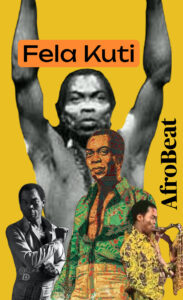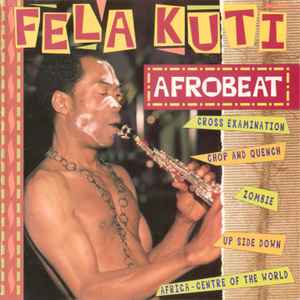 Fela Aníkúlápó Kútì also known as Abàmì Ẹ̀dá, was a Nigerian musician, bandleader, composer, political activist, and Pan-Africanist. Fela Kuti, a Nigerian musical icon, left an indelible mark on the global music scene with his creation of the genre AfroBeat. Born in 1938 in Abeokuta, Nigeria, Fela’s journey as a musician and activist reshaped the landscape of African music and inspired countless artists worldwide. This article explores Fela Kuti’s life, his role in the creation of AfroBeat, and the enduring legacy he left behind.
Fela Aníkúlápó Kútì also known as Abàmì Ẹ̀dá, was a Nigerian musician, bandleader, composer, political activist, and Pan-Africanist. Fela Kuti, a Nigerian musical icon, left an indelible mark on the global music scene with his creation of the genre AfroBeat. Born in 1938 in Abeokuta, Nigeria, Fela’s journey as a musician and activist reshaped the landscape of African music and inspired countless artists worldwide. This article explores Fela Kuti’s life, his role in the creation of AfroBeat, and the enduring legacy he left behind.
Fela Kuti’s musical career began in the late 1950s when he moved to London to study music. During his time in London, he was exposed to a wide range of musical styles, including jazz, funk, and highlife, which would later influence his AfroBeat sound. After returning to Nigeria, Fela formed his band, Africa ’70, and began blending these diverse influences with traditional African rhythms.

One of the distinguishing features of Fela’s AfroBeat was its socially conscious lyrics. Fela used his music as a powerful tool for addressing pressing issues, such as government corruption, social injustice, and human rights abuses in Nigeria. His songs, often laced with sharp political commentary, challenged the status quo and encouraged social change. “Zombie” and “Sorrow, Tears and Blood” are just a few examples of his politically charged compositions.
AfroBeat emerged as a genre in the late 1960s, and Fela Kuti is widely credited as its principal architect. AfroBeat combines elements of jazz, highlife, Yoruba rhythms, and funk with politically charged lyrics. This fusion gave rise to a unique, groovy, and highly danceable sound that was both infectious and thought-provoking. This Afrobeat groove was embodied by hit songs like “Shakara”.
In 1977, Fela released his groundbreaking album, “Zombie,” which directly criticized the Nigerian military regime. The song “Zombie” mocked the blind obedience of soldiers to their superiors and became an anthem for those opposing the authoritarian government. However, the government’s response was brutal, leading to the infamous raid on Fela’s Kalakuta Republic commune and the destruction of his recording studio.
Despite the risks and challenges he faced, Fela Kuti continued to use his music to push for social and political change. His artistry and activism were inseparable, and he inspired a generation of African musicians and activists to use their voices for a greater purpose.
Fela Kuti’s legacy lives on, both in the music he created and the political movements he inspired. His influence can be seen in the work of contemporary artists like Burna Boy and Femi Kuti, his son, who has continued to champion AfroBeat and political activism. Furthermore, his impact on the global music scene cannot be overstated, as AfroBeat continues to be celebrated and explored by musicians and audiences worldwide.
Jump ‘N Funk Reimagining Fela
Rich Medina’s Jump ‘N Funk party has now been rocking dancefloors across the globe with multimedia and videos showcasing Fela’s performances by Marc Hines. It began as an underground New York event aimed at raising awareness for Fela Kuti’s musical message and his contribution to music as well as his political and cultural legacy, Medina has made his events a platform to celebrate Afro-Life across the Black Diaspora. With guests such as Wunmi, the cast of Fela! On Broadway, Asiko and Antibalas providing captivating live performances, Jump ‘N Funk is so much more than a club night.
Here a Jump ‘N Funk mix by Rich Medina:
Fela Kuti’s role in the creation of AfroBeat is nothing short of revolutionary. His innovative fusion of musical genres, his socially conscious lyrics, and his unyielding commitment to using music as a force for change have solidified his place in history as a true musical and political pioneer.
Listen to Music Origins Fela playlist here:
The Significance of Fela Kuti’s Kalakuta Republic in the Community
Fela Kuti, the legendary Nigerian musician and activist, is widely celebrated for his pioneering role in the creation of the AfroBeat genre and his unwavering commitment to social and political change. Beyond his music, one of the most significant aspects of Fela’s life was his residence known as the “Kalakuta Republic.” This communal space in Lagos held immense significance for both Fela and the wider community, serving as a hub for artistic expression, political activism, and cultural innovation.
Kalakuta Republic, located at No. 14A Agege Motor Road in Lagos, was Fela’s home, recording studio, and a sanctuary for like-minded individuals. Its name, “Kalakuta,” derived from the Yoruba word “kalakutu,” which roughly translates to “rascal” or “a house of chaos.” It was a name that perfectly encapsulated the spirit of the place, which defied convention and challenged the status quo.
One of the most notable aspects of Kalakuta Republic was its role as a creative and artistic hub. Fela’s band, Africa ’70, rehearsed and recorded there, producing the infectious and politically charged AfroBeat music that would go on to inspire generations. The commune also housed artists, poets, and dancers, all of whom contributed to the vibrant artistic scene. It was a place where innovation thrived, where traditional and modern art forms collided, and where a spirit of artistic freedom prevailed.
Beyond its artistic significance, Kalakuta Republic was a hotbed of political activism. Fela used his music and his residence to protest government corruption, human rights abuses, and social injustices in Nigeria. His songs, such as “Zombie” and “Coffin for Head of State,” were daring critiques of the authoritarian regime of the time. Fela’s fearless approach to addressing these issues made Kalakuta Republic a symbol of resistance and a source of inspiration for those fighting against oppression.
However, Kalakuta Republic was not without controversy. Fela’s unapologetic stance against the government made him a target. In 1977, the Nigerian military raided the commune, resulting in the destruction of the property, severe injuries to Fela, and the death of his mother. The government’s actions only served to amplify the significance of Kalakuta Republic as a symbol of resistance.
Today, the memory of Kalakuta Republic lives on as a symbol of artistic and political freedom. The building itself no longer stands, but its spirit endures in the hearts of those who remember Fela Kuti’s contribution to Nigerian and global culture. Fela’s music continues to inspire artists and activists, and his legacy is celebrated every year during the Felabration festival in Lagos, which pays tribute to his life and work.
The Kalakuta Museum was opened to the public on October 15 2012 Kalakuta Museum is located at 7 Gbemisola St, Allen 100281, Ikeja, Lagos, Nigeria. In 2017 the Governor of Lagos State, Akinwunmi Ambode, provided additional funding to complete Theo and the family’s vision, and to acquire the adjacent property which serves as a car park and also houses rehearsal facilities which are used by Seun Kuti and Egypt 80, as well as staff quarters. Fela’s son, Kunle, now runs the Museum and, once again, it has become a vibrant and popular destination for local Fela aficionados, and for visitors from around the world who come to pay homage.
Kalakuta Republic was more than just a residence; it was a symbol of artistic innovation, political activism, and unwavering commitment to social change. Fela Kuti’s legacy and the significance of Kalakuta Republic remain embedded in the community’s history, and its impact continues to inspire those who value the power of art and activism in the fight for justice and freedom.
Red Hot + Fela
The one of the most noteworthy recent vinyl tributes, has recently been reissued feature striking opaque banana yellow and opaque red vinyl variants. All proceeds from this release go to support Red Hot, a non-profit organization committed to combating AIDS through the influence of pop culture. This album is a treasure trove of Fela Kuti’s timeless classics, each reinterpreted by a all-star roster of contemporary artists. Tunes like “Lady” are brilliantly reimagined by tUnE-yArDs, ?uestlove, Angelique Kidjo, and Akua Naru. Childish Gambino and Just A Band offer their take on “Who No Know Go No,” while My Morning Jacket, Merrill Garbus, and Brittany Howard lend their unique touch to “Trouble Sleep Yanga Wake Am.” “Zombie” gets a fresh interpretation by Spoek Mathambo, Cerebral Cortex, and Frown, and “Sorrow, Tears & Blood” receives a stunning makeover by the Kronos Quartet, alongside Kyp Malone and Tunde Adembimpe from TV On The Radio. Listen to Red Hot + Fela
References:
1. Moore, C. E. (2015). “Fela Kuti: The Man, His Music, and His Activism.” Journal of Pan African Studies, 8(1), 181-201.
2. Tischler, B. (2015). “Music and Politics in Fela Anikulapo-Kuti’s Afrobeat.” Journal of Popular Music Studies, 27(3), 288-318.
3. Fela Kuti: Music Is the Weapon (Documentary Film). (1982). Directed by Jean-Jacques Flori and Stéphane Tchal-Gadjieff.
4. Mabinuori Kayode Idowu. (2018). “Fela Anikulapo-Kuti: The Legendary King of Afrobeat Music.” Journal of Literature, Languages, and Linguistics, 41-47.
5. Sabin, R. (2011). “Afrobeat and the Politics of ‘Impossible Dance’.” African Studies, 70(2), 189-207.
6. Veal, M. E. (2000). “Fela: The Life and Times of an African Musical Icon.” Temple University Press.
